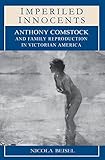Imperiled Innocents : Anthony Comstock and Family Reproduction in Victorian America / Nicola Kay Beisel.
Material type: TextSeries: Princeton Studies in American Politics: Historical, International, and Comparative Perspectives ; 67Publisher: Princeton, NJ : Princeton University Press, [1998]Copyright date: ©1998Edition: Course BookDescription: 1 online resource (288 p.)Content type:
TextSeries: Princeton Studies in American Politics: Historical, International, and Comparative Perspectives ; 67Publisher: Princeton, NJ : Princeton University Press, [1998]Copyright date: ©1998Edition: Course BookDescription: 1 online resource (288 p.)Content type: - 9780691027784
- 9781400822089
- 973.5
- HN90.M6 B45 1997
- online - DeGruyter
- Issued also in print.
| Item type | Current library | Call number | URL | Status | Notes | Barcode | |
|---|---|---|---|---|---|---|---|
 eBook
eBook
|
Biblioteca "Angelicum" Pont. Univ. S.Tommaso d'Aquino Nuvola online | online - DeGruyter (Browse shelf(Opens below)) | Online access | Not for loan (Accesso limitato) | Accesso per gli utenti autorizzati / Access for authorized users | (dgr)9781400822089 |
Browsing Biblioteca "Angelicum" Pont. Univ. S.Tommaso d'Aquino shelves, Shelving location: Nuvola online Close shelf browser (Hides shelf browser)

|

|

|

|

|

|

|
||
| online - DeGruyter The State against Society : Political Crises and Their Aftermath in East Central Europe / | online - DeGruyter On Constitutional Ground / | online - DeGruyter Why Movements Succeed or Fail : Opportunity, Culture, and the Struggle for Woman Suffrage / | online - DeGruyter Imperiled Innocents : Anthony Comstock and Family Reproduction in Victorian America / | online - DeGruyter Color Conscious : The Political Morality of Race / | online - DeGruyter City of Capital : Politics and Markets in the English Financial Revolution / | online - DeGruyter Threats to Democracy : The Radical Right in Italy after the War / |
Frontmatter -- CONTENTS -- ACKNOWLEDGMENTS -- ONE. Introduction: Family Reproduction, Children's Morals, and Censorship -- TWO. The City, Sexuality, and the Suppression of Abortion and Contraception -- THREE. Moral Reform and the Protection of Youth -- FOUR. Anthony Comstock versus Free Love: Religion, Marriage, and the Victorian Family -- FIVE. Immigrants, City Politics, and Censorship in New York and Boston -- SIX. Censorious Quakers and the Failure of the Anti-Vice Movement in Philadelphia -- SEVEN. Morals versus Art -- EIGHT. Conclusion: Focus on the Family -- NOTES -- BIBLIOGRAPHY -- INDEX
restricted access online access with authorization star
http://purl.org/coar/access_right/c_16ec
Moral reform movements claiming to protect children began to emerge in the United States over a century ago, most notably when Anthony Comstock and his supporters crusaded to restrict the circulation of contraception, information on the sexual rights of women, and "obscene" art and literature. Much of their rhetoric influences debates on issues surrounding children and sexuality today. Drawing on Victorian accounts of pregnant girls, prostitutes, Free Lovers, and others deemed "immoral," Nicola Beisel argues that rhetoric about the moral corruption of children speaks to an ongoing parental concern: that children will fail to replicate or exceed their parents' social position. The rhetoric of morality, she maintains, is more than symbolic and goes beyond efforts to control mass behavior. For the Victorians, it tapped into the fear that their own children could fall prey to vice and ultimately live in disgrace. In a rare analysis of Anthony Comstock's crusade with the New York and New England Societies for the Suppression of Vice, Beisel examines how the reformer worked on the anxieties of the upper classes. One tactic was to link moral corruption with the flood of immigrants, which succeeded in New York and Boston, where minorities posed a political threat to the upper classes. Showing how a moral crusade can bring a society's diffuse anxieties to focus on specific sources, Beisel offers a fresh theoretical approach to moral reform movements.
Issued also in print.
Mode of access: Internet via World Wide Web.
In English.
Description based on online resource; title from PDF title page (publisher's Web site, viewed 30. Aug 2021)


